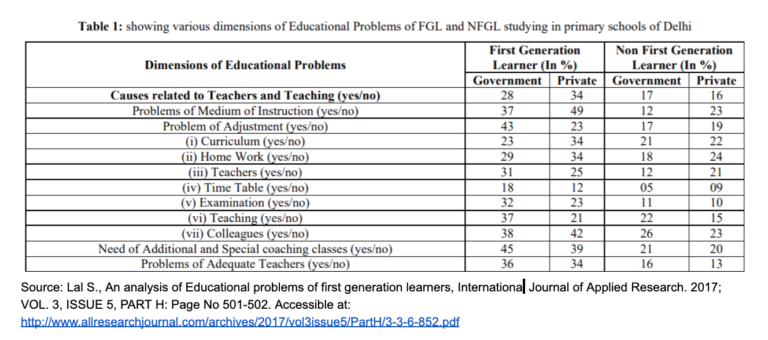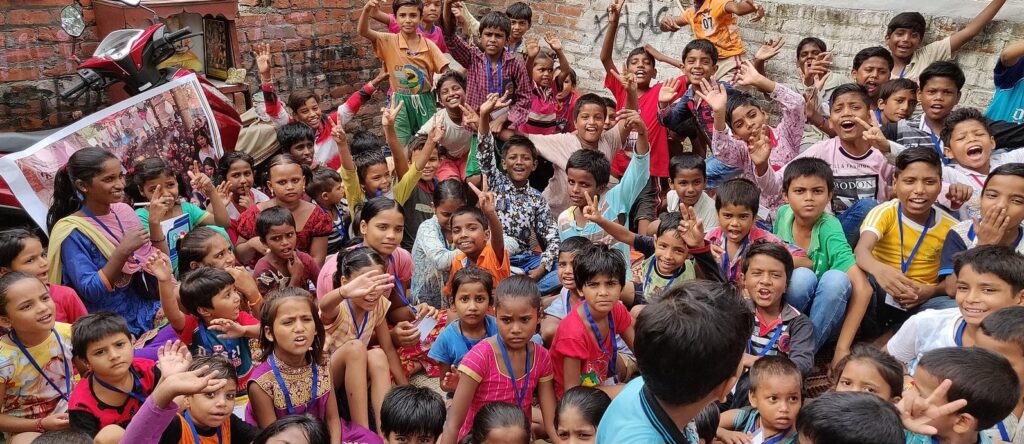An issue in Indian education that affects government schools across the breadth of the nation yet doesn’t get its due importance is that of First Generation Learners (FGLs). First-generation learners refer to children who come from a family background with no previous access to formal education (Banerjee., Cole., Duflo, and Linden 2007). This issue was recognised in the Ministry of Education report-‘The Challenge of Education’ (2006) which said, “It seems essential to juxtapose the scenario of the education system against the internal dynamics of a society in which a large percentage of students are first-generation learners”(p.91).
Historically in India, class was determined by the caste system. This system of socially approved discrimination against communities considered lower or outside the caste system has had a big influence on the literary and learning achievements of individuals. According to Dreze and Sen (2002) this social background is still relevant to the elementary education of children in India. Access to education though legally universal has been granted to members of scheduled castes and tribes much later due to social circumstances. FGLs are economically disadvantaged and mostly a part of socially marginalised communities, which worsens their problem of adjusting in classrooms till today.
FGLs face a variety of academic, psychological, and cultural issues. Even after the identification of relevant problems that these learners face; there hasn’t been any progress in solving them. The academic challenges faced by FGLs in terms of classroom challenges related to understanding course content, methods of teaching, regular attendance, assessment, and participation in co-curricular activities are of great concern.

The government has a simple policy directive: that all children deserve to be in primary school classrooms. This allows FGLs to enter classrooms but there is little specific concern for the issues that affect the learning ability of these students; who have no one back home to explain to them their homework assignment, a tough spelling, or a simple word meaning. They rely almost exclusively on school teachers.
We must take into consideration the lack of sensitivity-training for educators in the Indian Education System, which affects their ability to handle the unique challenges of the FGLs. While teachers have started accepting the presence of these students, this comes attached with notions about their ability to learn. The educators end up blaming students for their “laziness” in the classroom and uncaring parents who don’t encourage learning. If educators fail these students, their ability to continue learning becomes rather compromised and we see a significant dropout rate for first-generation school-goers as per a study by Azim Premji University; May 2015.
The Way Forward
Education is a process that involves interaction between people who have a range of ideas and beliefs. This often means that the ideas held by educators; such as those on caste and class, play a significant role in shaping their perception towards different students. This necessitates sensitivity training as a specific initiative undertaken by governments that will allow educators to think over the issues faced by FGLs and show greater compassion towards these students. Teacher sensitivity is about ensuring that teachers consistently show awareness and responsiveness to children’s current academic, cultural and emotional needs.
Another area of effort to encourage FGLs is offering some aid to these students in helping them understand the curriculum. Special classes or dedicated attention is considered an unrealistic demand in a country that lacks teachers and resources. However, as we enter a new era of education with the New Education Policy combined with a boosted educational expenditure we do hope it’s a realistic and achievable goal.
